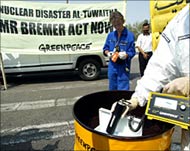US accused of ignoring radiation
Greenpeace is accusing US occupation forces in Iraq of breaching international law and refusing to allow UN experts to assess contamination of a nuclear plant near Baghdad.

The environmental group says it has detected high levels of radioactivity in homes and schools around the Tuwaitha nuclear plant. They say US forces are refusing to recognise the problem occurring about 20 km east of Baghdad.
Mike Townsley, head of the group’s Iraq investigation team, said the US is breaching the Geneva Conventions by “failing in its responsibility to ensure the public health of the Iraqi people”.
The conventions lay out the legal obligations of an occupying power, as well as the rules of war and treatment of prisoners.
Townsley said that coalition authorities were ignoring what he called an urgent environmental health crisis caused by a “frightening array of radioactive material”.
To press its case, the group brought a barrel containing a radioactive sample of yellow cake – one of the main ingredients used for making nuclear fuel – to coalition headquarters in Baghdad.
Greenpeace brought the barrel with a letter addressed to top US civil administrator, Paul Bremer’s office. But they were refused entry said Townsley.
In the letter accepted by a US official, the group said: “We urge you to immediately meet your obligations to protect the health of those who live around Iraq’s nuclear sites.”
“We urge you to immediately meet your obligation to protect public health by calling on the International Atomic Energy Agency (IAEA) to mount an urgent investigation into radioactive contamination around Al-Tuwaitha.”
 |
| Greenpeace says radiation levels are up to 10,000 above normal |
Radioactive material was looted from the plant in the chaos that followed the collapse of the Saddam Hussein government on 9 April.
Greenpeace says it has noticed an increase in reports of illnesses with symptoms consistent with radiation poisoning, adding that local doctors are ill-equipped to deal with the situation.
They believe there is sufficient evidence for Bremer to reassess his view that the plant poses no health risk.
Bremer’s administration has repeatedly denied that the Tuwaitha plant represents a threat to public health and has blocked efforts to allow the IAEA to access the plant, Greenpeace said.
The Iraqi atomic energy commission, along with the IAEA and the US army’s own radiation protection unit’s chief, Colonel Mark Melanson, has recommended that a UN team be allowed to assess the situation at the plant, Townsley said.
“The reason they (the IAEA) can’t get in is because their entry is being blocked by the US administration,” he added.
Last week, Greenpeace said that it had uncovered radioactivity in a number of buildings, including one source measuring 10,000 times above normal and another, outside a primary school, measuring 3000 times above normal.
On 20 June Science magazine reported that an IAEA team found most of the stored uranium feared stolen from Tuwaitha.
But locals were still storing radioactive barrels and lids in their houses and several objects carrying radioactive symbols lay discarded in the community.